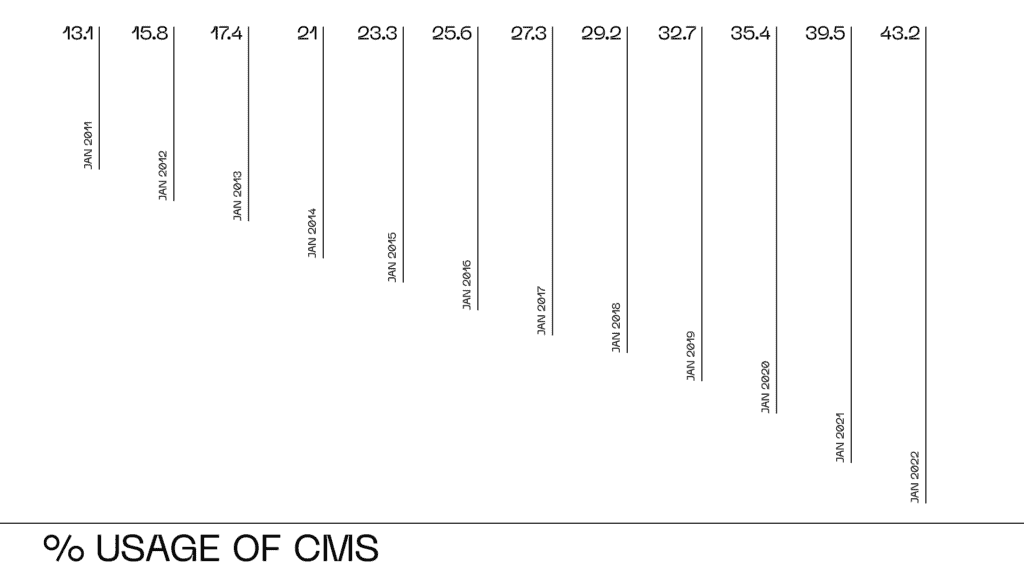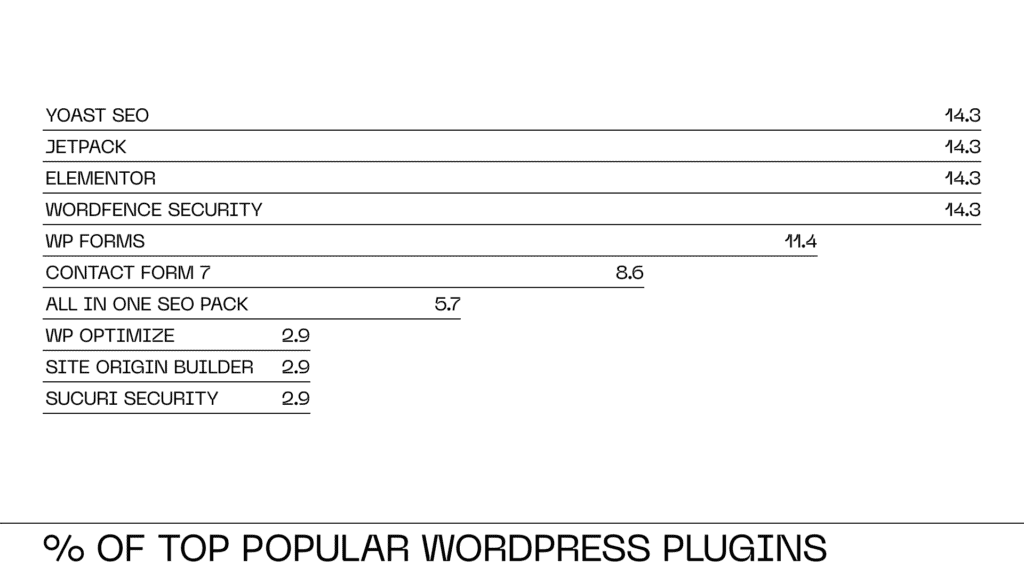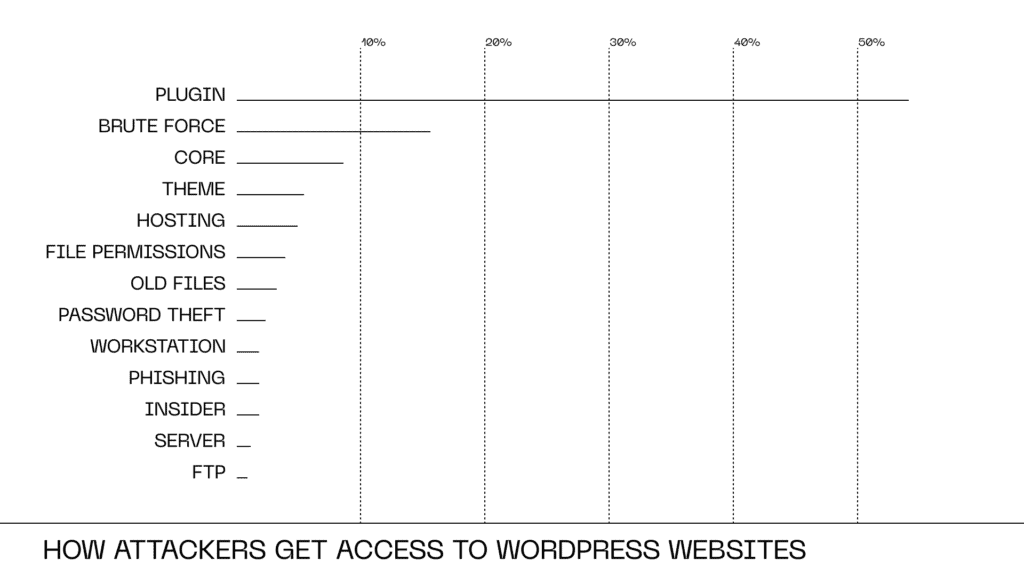WordPress continues to dominate as the most popular content management system worldwide, powering a staggering 43% of all websites. And yet, judging by the search stats, many people are concerned about whether this technology is still up to date and worth choosing for their business website in 2025.
In this blog post, we examine the pros and cons of WordPress, why businesses choose (or don’t) to hire a WordPress developer and share our own experience in providing PHP development services across various website types. By the end, you’ll have the information you need to decide whether WordPress is the right fit for your business.
Why do businesses choose WordPress?
Free and user-friendly
Installing and configuring a WordPress website is easy, even for non-technical users. Detailed guides are readily available online, making the process straightforward. Furthermore, extending the functionality of your website is as simple as adding a plugin, with an extensive library of options to choose from. When it comes to design, you can easily download pre-made themes.
The core software is free, and you only need to pay for a hosting provider. With these advantages, you may not even need to hire a WordPress development specialist for a small, uncomplicated project.
Easy management and flexibility
WordPress offers robust user management features, allowing you to assign individuals different access levels and permissions. This is particularly useful when multiple users, such as administrators, content editors, and contributing authors, are involved.
With WordPress, you have complete ownership and control over your website. You can access the source code and customize your site to fit your needs. There are also a variety of plans available, enabling you to start with an affordable option and upgrade as your business grows, offering more storage and additional perks.
Active community and support
WordPress boasts a large and active community, with online forums where users discuss issues and share valuable tips for maximizing WordPress’s potential for business. This vibrant community drives WordPress’s growth, constantly adding new themes and plugins that cater to current trends. Whether seeking solutions for specific ideas or troubleshooting problems, you can often find what you need without needing to engage a professional WordPress development company.

Ideal use cases for WordPress development
WordPress is renowned for its exceptional blogging and content publishing capabilities, attracting notable users such as The New York Times, Forbes, and TechCrunch.
However, its applications extend beyond blogging. Let’s explore some common and successful use cases for WordPress development.
Content-based websites
Thanks to its intuitive editor, customizable themes, and built-in blogging features, WordPress is an excellent choice for managing and publishing articles, images, videos, and other media content. WordPress provides the necessary tools and functionalities for effortless development, whether you’re starting a blog, news site, or an online magazine.
WordPress offers plugins like The Events Calendar for event organizers, conference websites, and event-focused businesses, allowing seamless event management, ticket sales, and RSVP handling.
Community forums
By leveraging plugins such as bbPress or BuddyPress, you can transform your website into a dynamic discussion platform, fostering user interaction and engagement. WordPress also offers plugins that grant the ability to restrict content to registered users or specific membership levels, making membership-based websites a reality.
Small online stores
WordPress, in combination with the WooCommerce plugin, equips small to medium-sized online stores with essential features for product selling, inventory management, payment processing, and integration with various shipping providers. This integration ensures that WordPress remains a viable choice for e-commerce business website development.
Moreover, with the flexibility to add contact forms and interactive elements, WordPress can be extended to accommodate professional websites, including portfolios and small business websites, enabling effective product showcasing, service presentations, and customer interaction.
Educational platforms
With the integration of learning management system plugins like LearnDash or LifterLMS, WordPress has become a powerful tool for creating online courses, e-learning platforms, and educational websites. These plugins offer robust course management features, progress tracking, assessments, and student engagement tools, making WordPress development an excellent choice for educational purposes.

When WordPress falls short and alternative solutions
When considering scenarios where WordPress may not be the best fit, several factors come into play
Complex web applications
Highly customized applications with extensive backend functionality, such as social networking platforms or data analytics software, often require more control over customization and performance than WordPress can provide. Frameworks like Laravel, Ruby on Rails, or AngularJS are better suited for these projects.
Large-scale e-commerce platforms
While WordPress has the Woocommerce plugin for online shops, it cannot provide sufficient functionality for large e-commerce platforms. Enterprise-level platforms, multi-vendor marketplaces, subscription-based services, and digital product platforms with complex inventory management demand extensive scalability, robustness, and specialized features.
As businesses grow, many companies eventually switch to custom software development that can better accommodate their unique requirements.
Integration of custom platforms allows businesses to scale and adapt more effectively as they expand, offering advanced features and ensuring seamless operations across all aspects of their e-commerce platform.
Highly specialized websites
Certain industries or niche markets, such as learning management systems (LMS), data-intensive applications, booking systems, and healthcare management systems, often involve complex workflows and must adhere to specific regulations.
Dedicated software solutions like Django, Flask, Node.js, Laravel, or Ruby on Rails are ideal for developing these specialized websites. They simplify the integration with external APIs, and businesses can ensure compliance and efficient operation management.
High-security websites
While WordPress itself is generally secure, vulnerabilities in its plugins and themes can pose a risk. If a WordPress website owner uses outdated core software or plugins and doesn’t regularly verify security measures, they increase their website’s exposure to hacking.
Therefore, WordPress is highly unadvisable for governmental solutions, financial software, cryptocurrency, medical websites, and corporate websites. Choosing a custom-built solution with built-in intricate security measures minimizes the risk of exposure to hacking and ensures comprehensive protection for sensitive data.
By leveraging custom development services, businesses can implement advanced security measures tailored to their needs, safeguarding their online assets and maintaining user trust.
Real-time software
WordPress is primarily designed for managing and publishing website content, making it less suitable for applications that require real-time functionality, such as instant messaging, collaborative tools, multiplayer games, or bidding platforms.
Specialized technologies like Node.js, React, or Angular are necessary to develop these tools effectively. These frameworks provide real-time capabilities to deliver seamless user experiences in dynamic environments.

How to find a good WordPress developer?
Technical skills, experience, and personal traits contribute to being a successful software developer, and the same applies to WordPress development.
- Proficiency in WordPress: Understanding the architecture and functionality of WordPress is crucial for effective development. So is in-depth knowledge of WordPress core, themes, plugins, and APIs.
- Strong coding skills: Expertise in programming languages such as PHP, HTML, CSS, and JavaScript and knowledge of database management (typically MySQL) is important for developing and customizing WordPress websites.
- Theme and plugin development: The ability to create custom themes and plugins from scratch and customize existing ones is valuable. Additionally, familiarity with popular frameworks and tools like Bootstrap, jQuery, and Sass can enhance development capabilities.
- Problem-solving skills: A good WordPress developer should be able to identify and resolve bugs, compatibility problems, and performance optimization challenges.
- Responsive web design principles understanding, and knowledge of CSS frameworks are essential for creating mobile-friendly websites.
- Security awareness and knowledge of best practices are crucial to protect websites from potential vulnerabilities and hacking attempts.
- Familiarity with search engine optimization (SEO) principles and practices allows developers to build websites with good on-page SEO elements. This includes optimizing page speed, clean URLs, structured data, and meta tags.
- Communication and collaboration skills are important for effective client interaction, understanding project requirements, and collaborating with team members.
- Continuous learning: The field of web development, including WordPress, is constantly evolving. A good WordPress developer should be proactive in staying updated with the latest trends, new features, security practices, and emerging technologies.
- Attention to detail ensures that websites are error-free, visually appealing, and functional. This includes thorough testing, ensuring cross-browser compatibility, and optimizing website performance.
- Time and project management: Being organized, setting realistic expectations, and managing client expectations is key to successful WordPress development.
- Client-centric approach: A good WordPress developer should have good listening skills, be able to translate client requirements into technical solutions, and provide ongoing support.
Staff augmentation services at Syndicode
Syndicode has developed a framework for meticulously selecting and filtering candidates with the abovementioned skills, backed by a proven track record. The specialists we offer through our staff augmentation and outsourcing models are the same individuals who work on our internal tasks whenever they are available.
You’ve read it right! Although Syndicode focuses on more robust technologies like Ruby on Rails, Python, and Node.js, our website runs on WordPress. We chose this platform because of its easy customization and content management. It was crucial that the marketing and HR teams could independently update content without involving a developer. And it works for us!
Our WordPress developer, Vera Prykhodko, shares her experience:
“I’ve never had issues maintaining and updating syndicode.com according to the business’s needs. Of course, our website isn’t perfect as it evolved with the company, developed by different specialists at different times. Like most business websites, there may come a point when we need to rebuild it entirely, creating a new architecture and clearing technical debt. However, for now, the website is well-made, and I manage it with minimal effort.”
Syndicode also works on client projects involving WordPress, creating customized websites from scratch or integrating it with other frameworks. For instance, in the BookYaBike project, Ruby powers the main site while WordPress handles the blog, ensuring a convenient CMS and fast loading with a complex booking system.
Summing up
Businesses choose WordPress development due to its cost-effectiveness, user-friendly interface, and ease of customization, making it ideal for content-based websites, community forums, small online stores, and educational platforms.
However, it is important to recognize that for more complex projects such as web applications, large-scale e-commerce platforms, specialized websites, high-security requirements, and real-time software, custom solutions using technologies like Laravel, Ruby on Rails, Django, or Node.js are better suited.
At Syndicode, we understand the limitations and strengths of various technologies, and we prioritize your satisfaction and success over pushing a specific technology solely based on our offerings.
Our expertise in multiple popular technologies ensures that we provide the best possible tech stack tailored to your specific needs. By engaging experienced developers with the necessary skills and expertise, you can achieve efficient customization, optimal performance, and robust security for your website development projects, avoiding common pitfalls associated with improper technology choices.
